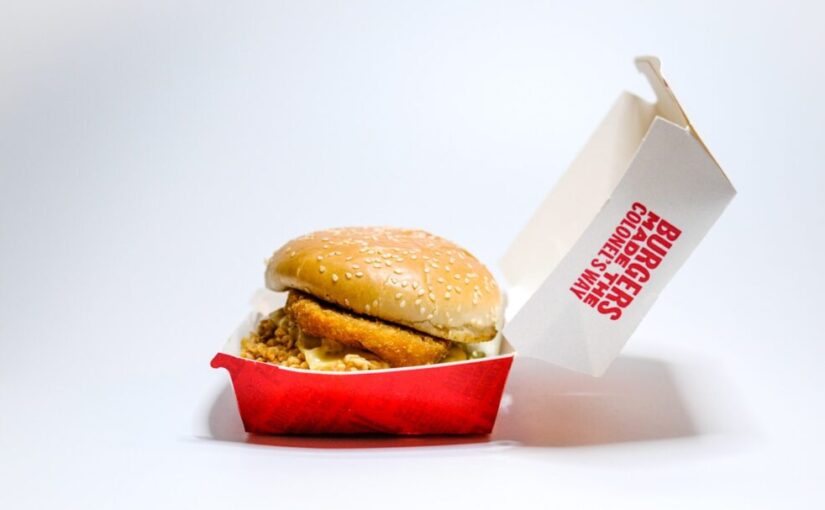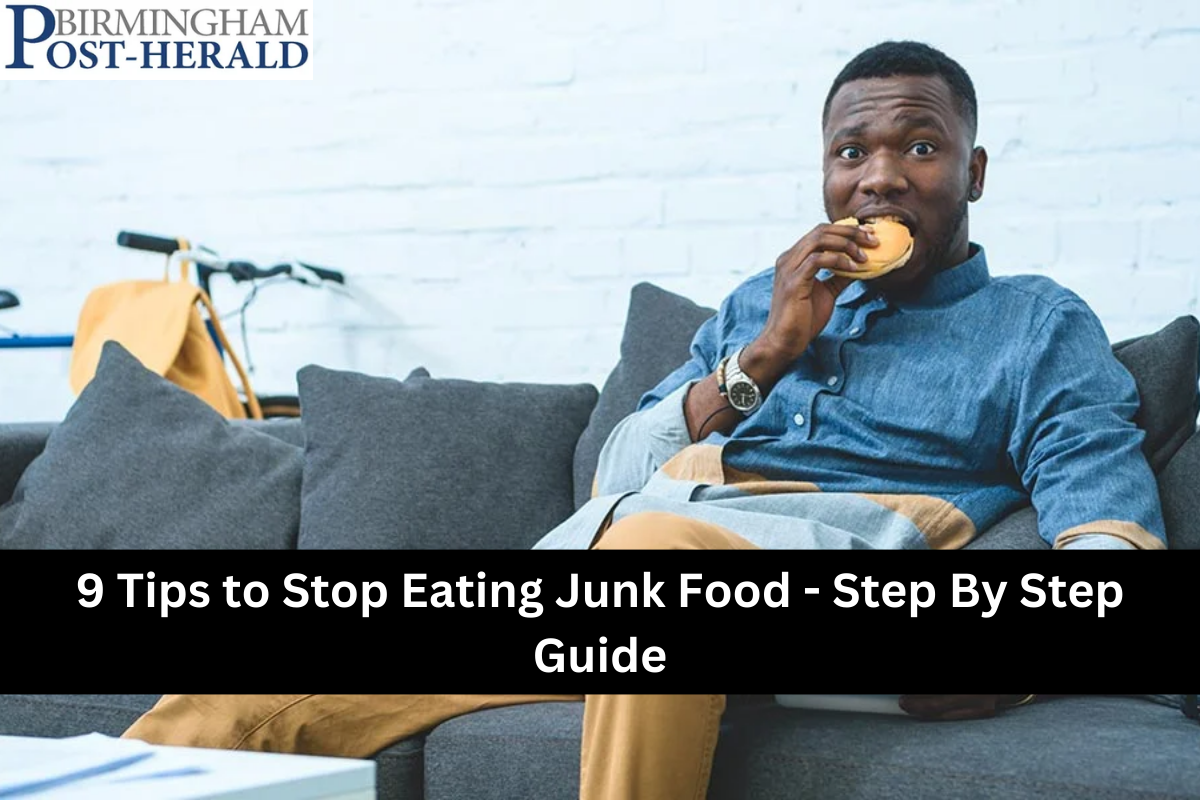9 Tips to Stop Eating Junk Food – Step By Step Guide :- Ultra-processed meals and drinks including fast food, soda, candy, cookies, and salty snack items are called junk food. Most people’s diets include these foods. In fact, some studies show that junk food accounts for approximately 50% of the average American’s daily calories.
Enjoying your favorite foods like baked goods, ice cream, and chips occasionally is fine, but eating junk food too often might affect your physical and mental health. Junk food diets are linked to obesity, fatty liver, high blood sugar, depression, heart disease, and some malignancies. There are several ways to quit junk food if your diet is high in it.
9 Tips to Stop Eating Junk Food
:max_bytes(150000):strip_icc():format(webp)/JunkFood-a6c8e83e73234364952384b8ba49e783.jpg)
Here are 9 evidence-based tips that can help you eat less junk food.
1. Cook More Meals at Home
- Increasing home cooking is one of the best strategies to reduce junk eating. People select convenience meals like sweetened coffee, donuts, and fast food when they’re on the run and have no other options.
- dinner planning and cooking more at home can reduce your dependency on convenience foods and guarantee you always have a nutritious snack or dinner. Cooking more has been linked to healthier diets, including more fruits and vegetables, less fast food, and lower obesity rates than eating out. They also spend less on meals.
- Start gently by cooking one or two meals a week at home if you’re new to it, then increase your efforts.
2. Eat More Protein
- Protein is the most satiating nutrient and strongly influences meal intake and choices. Studies show that eating more protein reduces snacking and overeating, which may help you consume less junk food.
- Cutting carbs and substituting them with fat and protein may lower food cravings and calorie intake, according to study. A four-week higher protein, lower carb diet comprising 14% carbs, 58% fat, and 28% protein reduced food cravings, particularly sweets and fast food, in a small 2019 trial of 19 adults.
- In addition, this diet improved dietary constraint and reduced hunger and disinhibition, which causes overeating in the presence of highly attractive meals like junk food.
3. Fuel Your Body Regularly
- Being too tight with your food consumption or calorie intake may seem like a good strategy to lose weight or avoid junk food, but it might backfire.
- Although the relationship between calorie restriction and cravings is complex, some evidence suggests that missing meals and depriving your body of particular foods may boost desires and snacking.
- A 2020 analysis indicated that total food avoidance increases cravings for off-limits foods. Some studies also suggest that skipping breakfast may increase nighttime carb cravings.
- Everyone has varied calorie and meal time needs, but a meal plan with frequent, nutrient-dense, protein-rich meals and snacks may help you maintain a balanced calorie intake and prevent junk food cravings.

Also See :- 5 Food Groups That Are Easy to Digest- Step By Step Guide
4. Eat More Filling Foods
- If you struggle with diet and food choices, studying how specific foods affect your body and hunger may help you create a better diet and cut back on junk food.
- Most junk foods are high in calories but poor in fiber, protein, and healthy fats. Satiety after eating is greatly enhanced by protein and fiber.
- Before grabbing a donut and sugary coffee on your way to work, consider what your body requires and how that meal may affect your blood sugar, hunger, and mood.
- A higher-protein, higher-fiber breakfast like egg bits and fruit with unsweetened coffee can make you feel content and reduce junk food cravings later in the day.
5. Get Enough Sleep
- Depriving your body of quality sleep might affect your dietary choices and increase your appetite for junk food.
- Lack of sleep and altered sleeping patterns have been linked to increased calorie intake, snacking, and cravings for junk food and other high-carb, high-fat items.
- Unfortunately, one night of bad sleep might alter your dietary choices the next day. A 2019 research of 24 women revealed that reducing bedtime by 33%—two to three hours—increased hunger and food cravings. Chocolate cravings and greater portions increased with sleep decrease.
- The National Sleep Foundation recommends seven to nine hours of sleep every night for individuals to enhance and protect health.
6. Manage Your Stress
- Stress can harm your body and mind and affect your diet. Healthy stress management can help you eat less junk food, even though stress is unavoidable. Chronic stress affects cortisol, which regulates eating and food choices.
- Stress suppresses appetite in the short term. Studies reveal that prolonged stress increases junk food appetites and consumption.
- The 2021 study of 1,270 adults indicated that higher perceived stress levels were associated with higher ultra-processed food consumption. The study found that high-stress people ate roughly twice as much ultra-processed food than low-stress people.
- In working-class young adults, ultra-processed food consumption is linked to psychological stress. Evidence-based stress-reduction methods include meditation, exercise, therapy, and spending more time outside.

Also See :- How Does Eating Protein Help You Build Muscle- Step By Step Guide
7. Consider Overhauling Your Pantry
- Replace ultra-processed foods with healthier ones if your kitchen is full with junk food. Keeping tasty, easy-to-eat junk food in your kitchen can cause excessive snacking and calorie intake, which might harm your health.
- Even glancing at attractive meals stimulates the striatum, which governs hunger and food reward, according to research. Having highly appetizing foods like candies, chips, and cookies within sight may cause nibbling and overeating, even when not hungry.
- It’s fine to occasionally have a sweet or salty pleasure, but if you want to cut back on junk food, fill your kitchen with nutrient-dense products. Instead of candy, keep fresh fruit on your counter for a naturally sweet snack.
8. Don’t Start Restrictive Diets
- Diets that are too restricted might harm your health and connection with food. Ultra-restrictive diets can cause yo-yo dieting, a hazardous weight loss-gain cycle. Yo-yo dieting increases the risk of diabetes, high blood pressure, and metabolic syndrome as well as weight gain.
- Most fad diets are quite stringent, requiring complete sugar abstinence or major carbohydrate restriction. Avoiding particular foods and labeling them “off limits” can boost cravings and lead to overeating and an unhealthy relationship with food.
- Whether you’re attempting to reduce weight or clean up your food, a really tight diet isn’t necessary. Instead than adopting the next fad diet, try a Mediterranean-style or plant-centric diet for better health. These diets include protein-rich legumes, seafood, and fiber-rich vegetables to reduce cravings and promote satiety.
9. Grocery Shop Regularly
- A well-stocked kitchen encourages cooking and less junk eating. Studies show that shopping more correlates to healthier diets, including less ultra-processed food.
- Having trouble staying on track or deciding what to buy? Make a grocery list. Make a grocery list to avoid junk food and eat healthy.
- Fresh and frozen produce, nuts and seeds, canned and dried beans, and protein like poultry, fish, and tofu make a balanced grocery list.
- balanced foods on hand might motivate you to produce balanced meals and snacks for the week, minimizing junk food intake.
If you like this Article 9 Tips to Stop Eating Junk Food Please share With Your Friends And Family members.
